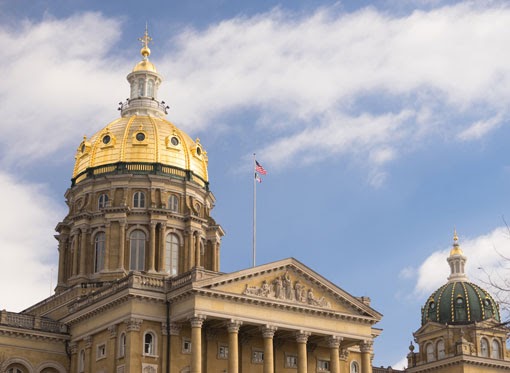Lawmakers to tackle some familiar issues, refocus on tax reform when 2022 Legislature convenes

MICHAEL CRUMB Jan 7, 2022 | 5:04 pm
3 min read time
783 wordsAll Latest News, Government Policy and Law The Iowa Legislature is scheduled to convene for the 2022 session on Monday, and the No. 1 priority appears to be solving the state’s workforce issues.
The Iowa Legislature is scheduled to convene for the 2022 session on Monday, and the No. 1 priority appears to be solving the state’s workforce issues.That includes finding ways to bring more people into the Iowa workforce, and filling positions left vacant as people quit or left jobs during the coronavirus pandemic. The pandemic hit working women the hardest, with many opting out of the workforce to stay home with their children.
That will likely mean a focus on some similar issues, and an increased focus on reducing and possibly eliminating the state’s individual income tax.
While the Legislature, where Republicans control both chambers (32-18 in the Senate and 60-40 in the House) has made progress in reducing Iowa’s individual income tax rate, 2022 could be a year where there is a stronger push to eliminate it altogether.
The individual income tax rate has decreased from nearly 9% five years ago to about 6.5%.
According to the nonpartisan Tax Foundation, Iowa’s individual tax brackets are not competitive, ranking the state 38th out of 50 states, and some lawmakers and business leaders say continuing to reduce and eventually eliminate the individual income tax can be a tool the state can use to make it more competitive and attract more people to move to Iowa.
While some lawmakers may advocate to eliminate it, others say it needs to be done more gradually, allowing the state to identify areas that can be tapped to replace the revenue that will be lost. Some argue that there is enough in state budget reserves to reduce or eliminate the tax without affecting other revenue sources, while still others are concerned that if eliminating the income tax means increasing the sales tax, it would have a disparate effect on low- and moderate-income Iowans.
Expect the income tax to take priority over corporate tax reform, with some lawmakers arguing
various tax breaks and incentives already offset much of the state’s corporate tax rate, which ranks 46th out of 50 in the country.
Members of the business community say making holistic changes for all taxpayers will make Iowa more competitive, and easier to recruit top talent to the state.
“As we look to grow Iowa’s population, expand business growth, and provide opportunities for all Iowans, modernizing our tax system is absolutely critical to make Iowa a more attractive place to live and expand business development,” said Joe Murphy, executive director of the Iowa Business Council.
Other issues lawmakers will focus on are likely to include continued work on improving access to quality, affordable child care, professional licensing reform to remove barriers to working in Iowa, housing, continued expansion of broadband, and education.
Many of those issues are included in legislative agendas for some groups, like the Iowa Business Council and the Greater Des Moines Partnership, and work on them will continue progress made in 2021.
Last year, lawmakers approved bills to eliminate the child care cliff effect by increasing the income eligibility requirements for child care assistance and creating a graduated phase-out for benefits as a family’s income rises up to 275% of the federal poverty level. They doubled the income eligibility level for child care tax credits from $45,000 to $90,000, and increased the reimbursement rates for child care providers to 50% of 2020 market rates.
They also approved $100 million to expand high-speed internet to underserved areas of the state, increased the Workforce Housing Tax Credit, earmarking $12 million for rural communities, and increased investment in the House Trust Fund from $3 million to $7 million.
There will likely also be attempts this year to approve incentives to attract people to the state. Things such as income tax exemptions and student loan forgiveness could be on the table in 2022. Look for an increased focus on placemaking, too, during the upcoming session.
Whatever happens, the focus of lawmakers should be on “finding common-ground solutions” that help recruit and retain top talent in Iowa and make the state a more attractive place to live, work and play, said Andrea Woodard, senior vice president of government relations and public policy at the Partnership.
“While there may not be one specific policy that is more important than others, the most important thing lawmakers can do is keep a laser focus on finding common ground solutions to move the needle forward on talent development and provide a sense of predictability and consistency for businesses,” she said.
Woodard and Murphy will be among the panelists participating in the Business Record’s Legislative Forecast on Tuesday, Jan. 11.
The Business Record will also be publishing an article next week from conversations we had with lawmakers last month, learning about their priorities for the 2022 session.










